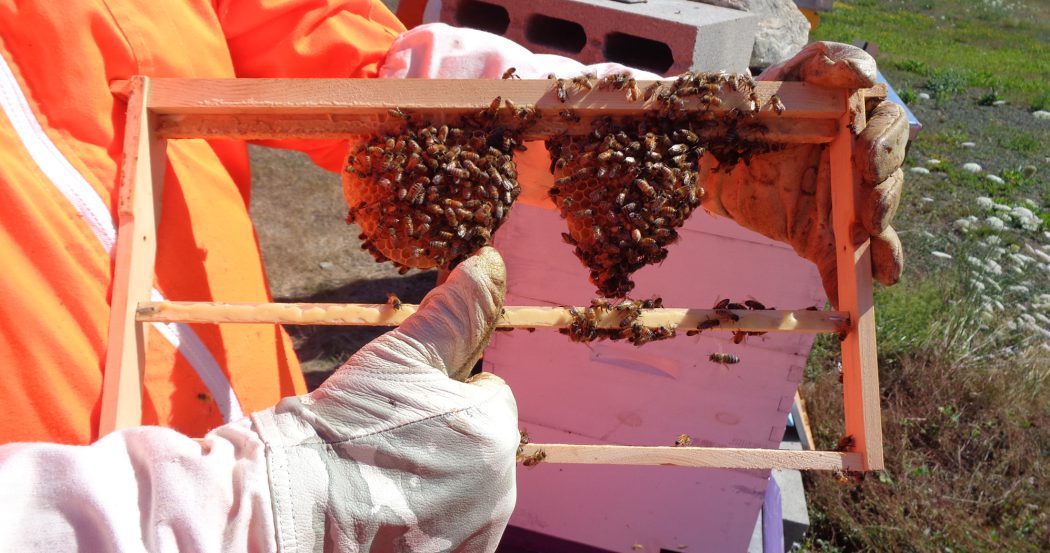By: Jane Dunstan
Originally published in the August/September 2023 issue of The Bee Line
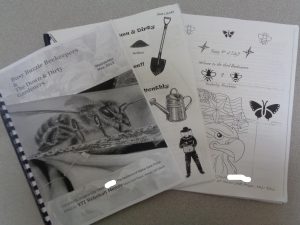 While giving a tap room talk on honey bees for The Farmer’s Lyceum speaker series at the Pour Farm in Union last Summer, I was approached by a woman carrying a bottle of honey. She stated she worked with several beekeepers at the Maine State Prison and when she heard I was speaking, came bearing a gift from the beekeeping residents. What ensued was a conversation regarding her work with them, specifically around offering beekeeping education and assisting with management of their hives. I expressed a desire to visit and interview the men who were keeping bees for an article in The Bee Line. We exchanged contact information with plans to reconnect in the Spring and establish a time for visitation. Those plans came to fruition this Summer.
While giving a tap room talk on honey bees for The Farmer’s Lyceum speaker series at the Pour Farm in Union last Summer, I was approached by a woman carrying a bottle of honey. She stated she worked with several beekeepers at the Maine State Prison and when she heard I was speaking, came bearing a gift from the beekeeping residents. What ensued was a conversation regarding her work with them, specifically around offering beekeeping education and assisting with management of their hives. I expressed a desire to visit and interview the men who were keeping bees for an article in The Bee Line. We exchanged contact information with plans to reconnect in the Spring and establish a time for visitation. Those plans came to fruition this Summer.
Prior to scheduling a visit to the prison, it was necessary to complete credentialing requirements and training for volunteers. Upon entering the prison with only my keys, license, a writing pad and pen, I registered and waited for an escort to arrive. Rebekah Mende, the vocational trades instructor (VTI), the same individual who reached out and attended the talk a year prior, met me in the waiting area and explained the process of entering the heart of the prison. While walking to our destination, Rebekah reviewed some statistics and protocols regarding the prison. This maximum security prison has the capacity for 1,100 residents, however currently houses 800 men along with 400 staff including day/night shifts, security, support staff and contracted professionals (medical and mental health staff). While incarcerated, residents refer to each other by their last name to create distance, however with visitors, they utilize their first name or first initial only to identify themselves. I was not permitted to bring in a cell phone, tablet, record the interview or take photos. All photos in this article were taken by Rebekah or someone she designated. As we meandered down hallways and across the community grounds, I noted how beautifully landscaped the area was with both flower and vegetable gardens. Residents complete master gardening and horticulture programs as well as beekeeping if they so choose and volunteer to work in both the gardens and the hives. Of the food grown, 80% is utilized at the prison and 20% is donated to food banks in the area.
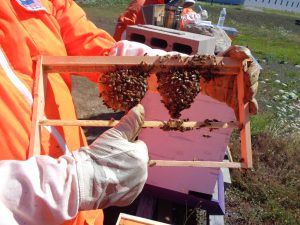 Programs offered to residents include the five week beekeeping program and the master gardener program with its greenhouse as its hub. The facility recently became registered as a monarch waystation. Residents find the larvae, put them in cages awaiting their maturity to caterpillars and finally as butterflies. At that time, they are tagged, released and tracked.
Programs offered to residents include the five week beekeeping program and the master gardener program with its greenhouse as its hub. The facility recently became registered as a monarch waystation. Residents find the larvae, put them in cages awaiting their maturity to caterpillars and finally as butterflies. At that time, they are tagged, released and tracked.
To date, 88 residents have gone through the five week beekeeper program. Currently, there are 53 beekeepers involved in varying degrees of participation. “I realized I don’t have to be the expert; my goal for the program is to have residents become the experts in keeping bees” states Rebekah. This year, they started the beekeeping season with eight hives. Two of the hives, which began as packages, are struggling. Last year, construction of stone pads for the colonies was begun with the hope to finish them this year, along with installing a wind break and elevating the hives further off the ground.
The fruits of their gardening labors were readily apparent as we approached the area where the beekeepers were waiting. With the greenhouse as the backdrop along with carts of watering cans, wheelbarrows and garden tools, I took a seat at the picnic table and was introduced to the beekeepers by first name prior to the start of the interview. They talked informally about how they try to get into the hives on a weekly basis and are now working hard on trying to raise a queen after adding extra frames of eggs and brood. Shaun discussed how he searched for the perfectly aged larvae and lots of eggs in a frame, placed it in a nuc with extra bees figuring “they have to make something!” He spoke of the collective discouragement of the beekeepers this Spring when hive eight was the only overwintered colony out of nine colonies. “We are ready to do varroa mite treatments after seeing serious wing deformities in the bees. They are struggling.”
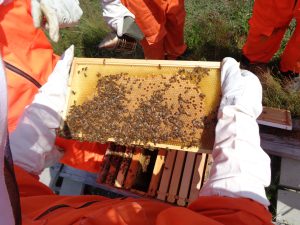 I began the interview with the question of whether anyone had prior experience with bees before becoming residents at the prison. Kevin had no prior experience and Shaun, who is in his second year keeping bees, had no previous experience but “tore apart every book on beekeeping I could find.” Henry, although new to beekeeping, was not new to agriculture. “When I leave here, I’m going back to the farm to keep bees. They are so important for pollination and gardening.” Jerry took the class in 2018 and has been a beekeeper for five years. He stated “as soon as you open a hive you’re hooked.” Jeff had no previous exposure to bees but reiterated “it is a great little program; it’s neat to learn and handle everything.” Chris, a third year beekeeper, first became involved in the gardening program and then realized the connection with pollinators which “inspired me to look at beekeeping.” F is a first year beekeeper with no prior beekeeping experience or interest. “I took Mende’s botany class at UMA and that put me back into flowers and plants. I wanted to learn as much as I could so I took the beekeeping class.” Colin was introduced to beekeeping in 2021 when the editor of their newsletter asked him to do the artwork for an issue. He created a bee comic strip which he was able to do after learning about bees. Danny commented “I didn’t want to sit around doing nothing. I wanted to fill my time with something purposeful. Becoming involved with the bees has helped me build coping skills and ideas for the future that I can put into my toolbox for when I start my life outside.” Mark, the editor of the beekeepers newsletter, said “I had friends who had bees and I was always interested.”
I began the interview with the question of whether anyone had prior experience with bees before becoming residents at the prison. Kevin had no prior experience and Shaun, who is in his second year keeping bees, had no previous experience but “tore apart every book on beekeeping I could find.” Henry, although new to beekeeping, was not new to agriculture. “When I leave here, I’m going back to the farm to keep bees. They are so important for pollination and gardening.” Jerry took the class in 2018 and has been a beekeeper for five years. He stated “as soon as you open a hive you’re hooked.” Jeff had no previous exposure to bees but reiterated “it is a great little program; it’s neat to learn and handle everything.” Chris, a third year beekeeper, first became involved in the gardening program and then realized the connection with pollinators which “inspired me to look at beekeeping.” F is a first year beekeeper with no prior beekeeping experience or interest. “I took Mende’s botany class at UMA and that put me back into flowers and plants. I wanted to learn as much as I could so I took the beekeeping class.” Colin was introduced to beekeeping in 2021 when the editor of their newsletter asked him to do the artwork for an issue. He created a bee comic strip which he was able to do after learning about bees. Danny commented “I didn’t want to sit around doing nothing. I wanted to fill my time with something purposeful. Becoming involved with the bees has helped me build coping skills and ideas for the future that I can put into my toolbox for when I start my life outside.” Mark, the editor of the beekeepers newsletter, said “I had friends who had bees and I was always interested.”
Nadim, who was unable to attend in person, did respond in writing about the benefits of the program. “As someone who took Mende’s beekeeping class last year, I can attest to the benefits of the program. It provides valuable vocational training and has a positive impact on the mental well-being of participants by reducing stress levels and improving relationships among incarcerated citizens and staff members. Beekeeping classes instill in us a sense of self worth and responsibility and offer numerous benefits to society. By learning the craft of beekeeping, we develop new skills and confidence that we can utilize once we leave prison, leading to employment and a reduced likelihood of re-offending. The beekeeping program at this prison is an excellent example of the benefits of quality educational programs, essential for successful reintegration into society. Educational and vocational programs like these are proof that we can use education as a means of transformation, even in challenging environments.” Greg responded “I’m blessed to be one of the original people who took the beekeeping class in 2017. We started with a few packages, dug into the hives weekly and it was always exciting and fun.” Rebekah chimed in “he has the Midas touch; he can spot a queen five yards away.” A retort of “it’s the only reason we keep him kicking around” followed, at which point Greg quipped, “Can you feel the love?” He shared a story of when he first got suited up, taped his ankles and wrists and when asked whether he was ready, stopped dead in his tracks and sheepishly uttered “I gotta pee.”
The men were reflective when asked what has amazed them the most about keeping bees. Greg commented first. “You go in, put in a frame of foundation, go back and find they have drawn out the foundation with wax, then the queen goes and lays eggs and you find all this brood and then they jam the cells with pollen and nectar.
Last year we just put in a bar and it was cool to see the bees pull down three little ‘dippity dos’ of foundation on their own. It’s just watching nature.”
Richard stated “the first thing I notice is the smell of the hive.” Kevin replied “I’m a man of God and it amazes me to watch God’s creatures be so obedient and know what to do. No one has to guide or lead them.”
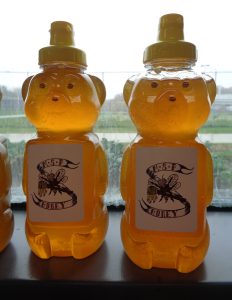 Henry said “I’ve never been scared. Being in the hives makes me realize how gentle and forgiving they are… that is so amazing to me.” Shaun stated “the thing that amazes me the most is their ability to survive anything and pass on their genes. If the hive goes queenless, they have the ability to know what is needed at the time.” Jeff remarked that he is astounded by the whole process; “how these little creatures can handle all their business; start off with nothing and get honey in the end. They just kill it!” Danny was surprised by the difference in the taste of natural honey versus store bought honey. “I’ve been lied to! The stuff you buy in the store isn’t honey! He was also cognizant of the effect bees have on the community of beekeepers at the prison. “It has taken on a spirit of its own and has brought us closer together as a community. There is talk of it all the time.” F shared that “bees impact us; people who never talked to each other before now have something in common.” He was also astonished that after all the grounds are mowed, the bees can still find food. John was touched most by their nature, creating life and being a conduit to the further progression of plants and their part in the world.” Colin felt they were important to the world in general. “If there were no bees we would struggle to survive.” Mark was moved by their work ethic. “If an animal, like a skunk, comes in and damages their comb, they repair it. We come here… don’t have anything… but work toward something… and eventually have everything we need. Bees are the same way; they start off with nothing, then create cells which they fill with honey, food and eggs. They work their tails off… just like us.”
Henry said “I’ve never been scared. Being in the hives makes me realize how gentle and forgiving they are… that is so amazing to me.” Shaun stated “the thing that amazes me the most is their ability to survive anything and pass on their genes. If the hive goes queenless, they have the ability to know what is needed at the time.” Jeff remarked that he is astounded by the whole process; “how these little creatures can handle all their business; start off with nothing and get honey in the end. They just kill it!” Danny was surprised by the difference in the taste of natural honey versus store bought honey. “I’ve been lied to! The stuff you buy in the store isn’t honey! He was also cognizant of the effect bees have on the community of beekeepers at the prison. “It has taken on a spirit of its own and has brought us closer together as a community. There is talk of it all the time.” F shared that “bees impact us; people who never talked to each other before now have something in common.” He was also astonished that after all the grounds are mowed, the bees can still find food. John was touched most by their nature, creating life and being a conduit to the further progression of plants and their part in the world.” Colin felt they were important to the world in general. “If there were no bees we would struggle to survive.” Mark was moved by their work ethic. “If an animal, like a skunk, comes in and damages their comb, they repair it. We come here… don’t have anything… but work toward something… and eventually have everything we need. Bees are the same way; they start off with nothing, then create cells which they fill with honey, food and eggs. They work their tails off… just like us.”
The question of what has been the most difficult aspect of keeping bees elicited a number of responses which the group could collectively agree upon. Mark began the discussion stating “watching us lose them. We work so hard to keep them alive. We started with one, got seven new ones to make eight and then found out only one survived.” Greg said “it’s hard when you overwinter them and take the cover off in early Spring, find the hive alive and then two weeks later, the hive is dead.” When we talked about possible culprits which may have resulted in the dead outs, they identified mites, small cluster size and cold as the three main causes. We discussed Winter bees and the importance of treating for mites which prompted many questions about thresholds and miticides. When the targeted discussion resumed, Henry shared the most difficult thing for him was “not being able to be in the hives more often; having such a hands off approach to them. I so want an observation hive.” Shaun felt location has been difficult in that “we have to rely on other people to get out to them. Trying to help a struggling hive survive with limited resources in terms of bees and brood is tough.” Danny felt the hardest thing was waiting for the honey to be ready to extract and the sheer amount of information you need to know.
The beekeepers were asked whether they would like more educational opportunities regarding management of their colonies. Henry was eager to say “I would love an advanced beekeeping course, have a hands-on queen rearing course and have more knowledge in general. I have read every back issue of American Bee Journal and Bee Culture that we have and I’ve ordered books.” Shaun stated “I would like to work with Mende to create an advanced beekeeping class and after three years, try to get a master beekeeping certificate through Cornell here on grounds. I want to take a couple of hives and learn how to make queens. We already have a three part mating nuc, grafting bar and Chinese grafting tool. Now to get to the next step. I really want to rear queens and produce enough queens to help people in the area. Cornell has a special rate for prison residents which is $500 and has adapted a model to work inside correctional settings. They are willing to accept a video tape of a hive inspection. We don’t know how we are going to pay for it yet though.” When asked if they could use proceeds from honey sales, Shaun indicated they don’t sell any honey. All the honey which is extracted goes to the beekeepers in the program, staff and the kitchen. Greg has a lot of interest in top bar hives and wishes to learn more.
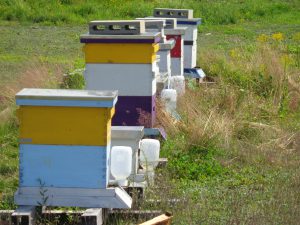 In conclusion of our time together, I asked them what their personal goals were with beekeeping. Henry wishes to return to the farm where bees will be an integral part of his life there. Mark wants his daughter to have bees instead of a puppy and plans to implement that once he walks out of the prison doors. Shaun not only wants to become a master beekeeper but desires to “help Mende train up the next group of beekeepers to be the best we can be, get all the hives through Winter because we did everything right.” Shaun spoke about how “beekeeping gives him a purpose; I love teaching and learning. It gives me the opportunity to pursue something and not get lost down a rabbit hole. It makes my brain happy to try new things.” Henry said “bees give me a sense of community. Everything you do in this prison, every group you are involved with expands your experiences and changes the climate. The more people who get involved, the kinder and gentler the environment becomes.” Colin felt that working with the bees will continue to influence his artistic abilities. Mark shared “it keeps me motivated, opens my eyes to different things I’ve never experienced before. We can call it “ours”. It has definitely changed me.”
In conclusion of our time together, I asked them what their personal goals were with beekeeping. Henry wishes to return to the farm where bees will be an integral part of his life there. Mark wants his daughter to have bees instead of a puppy and plans to implement that once he walks out of the prison doors. Shaun not only wants to become a master beekeeper but desires to “help Mende train up the next group of beekeepers to be the best we can be, get all the hives through Winter because we did everything right.” Shaun spoke about how “beekeeping gives him a purpose; I love teaching and learning. It gives me the opportunity to pursue something and not get lost down a rabbit hole. It makes my brain happy to try new things.” Henry said “bees give me a sense of community. Everything you do in this prison, every group you are involved with expands your experiences and changes the climate. The more people who get involved, the kinder and gentler the environment becomes.” Colin felt that working with the bees will continue to influence his artistic abilities. Mark shared “it keeps me motivated, opens my eyes to different things I’ve never experienced before. We can call it “ours”. It has definitely changed me.”
As we walked to the apiary to see their hives buzzing with activity at all the front entrances, they were eager to talk about the different colonies and the issues intrinsic to each of them. I was given a tour of their newly organized storage area which they had proudly worked on a few days before. Feeders, supers, honey buckets, frames, woodenware and insulation for winterizing all had their designated areas for easy access.
While strolling back to their main work area, I asked them what their needs or wants were at this point in their beekeeping journey. Their responses included:
- someone to teach them about queen rearing and grafting
- more educational opportunities with guest speakers
- an observation hive so they could watch bees throughout the year
For anyone who has a desire to spend time with these beekeepers or has an observation hive, large or small that they wish to donate, please contact me at rmllamas1@gmail.com.
The beekeepers were most appreciative of the visit and interview. I found the experience both humbling and insightful. Several of their responses touched me as well as the parallels they drew between the bees and themselves. Not knowing what to expect initially, I would return in a heartbeat to work with them in their hives and spend time in the classroom both teaching and learning from them.
Originally published in The Bee Line: https://mainebeekeepers.org/the-beeline/






